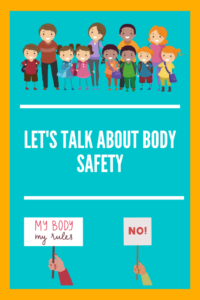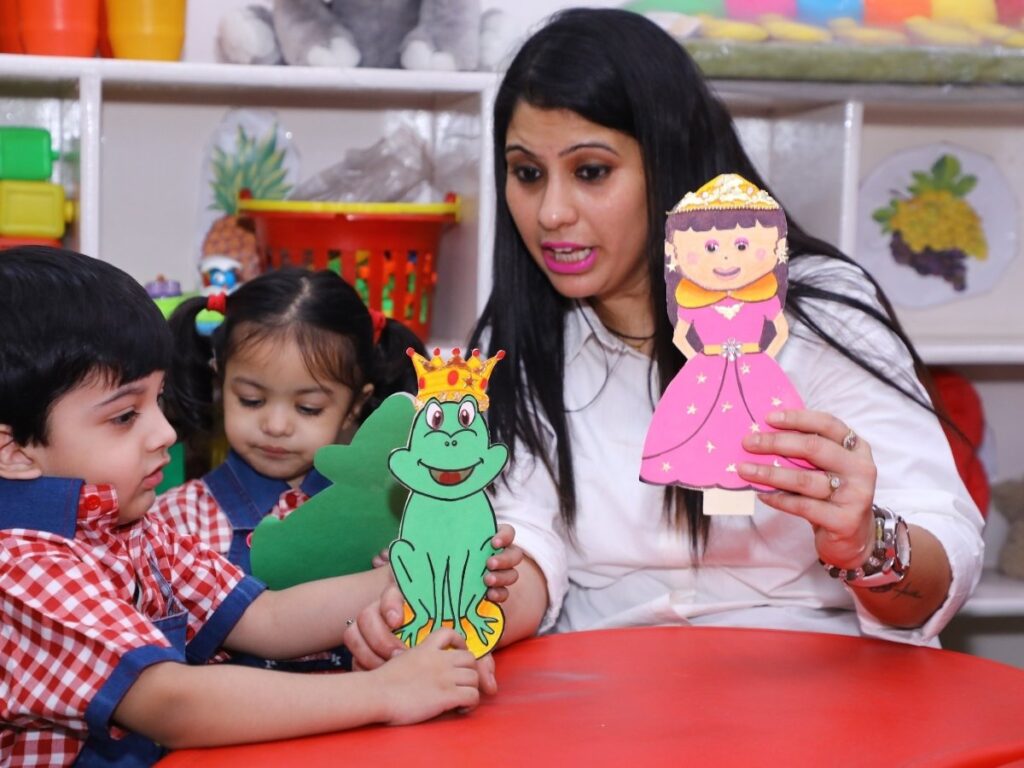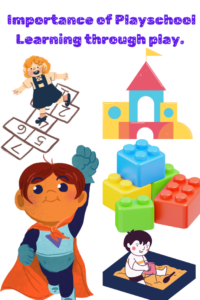
Welcome To The Silverline Prestige School
Body Safety : A helpful guide for parents to empower children with healthy boundaries.
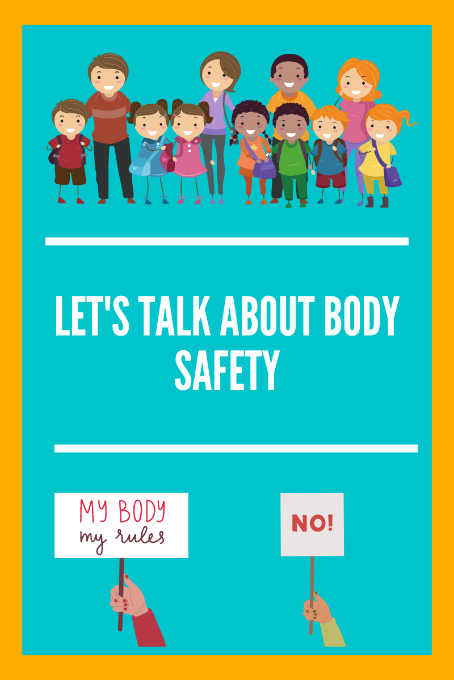
Body Safety is a crucial topic that every parent needs to discuss early on with their child. We instruct our children on all kinds of safety rules. However, when it comes to body safety, it is a subject that is discussed or referred to in hushed tones. Why? Because it is unfathomable that such a heinous crime can be committed against children. The statistics, however, will disagree with you and leave you aghast. The disinclination to address body safety is akin to not informing your child about touching fire. The results of such ignorance can prove to be unfortunate. Silverline School, in this blog, looks into essential aspects of child safety and why adults need to be more vociferous on this subject.
Our blog will cover the following essential questions we must discuss with our children.
1. What is Body Safety?
2. Why should children be taught about body safety rules?
3. What is the right age to discuss body safety?
4. What are the Body Safety rules for children?
5. Body Safety activities for preschoolers.
6. Book Recommendations on body safety rules for children.
1) What is Body Safety?
Body safety is an imperative education that children should receive to understand sexually abusive behaviours, inappropriate touching, and safe and unsafe touch.
It is merely not cautioning the child to stay away from strangers. It is a necessary life skill.
Body safety explains the following safety aspects to children:
- Ownership of their bodies.
- Respecting their own body and others.
- Establishing firm boundaries.
- Comfortable and Uncomfortable feelings around people.
- Knowing who is a trusted and safe adult.
- Open communication with a safe circle of adults.
2) Why should children be taught body safety rules?
How many times do we caution our children to be safe?
- Hey, do not go there; you might fall.
- Hey, do not eat this; it is unhealthy food.
- Hey, brush your teeth.
- Hey, you need to sit in the car seat.
- Hey, too much screen time is damaging.
Despairingly, we also have to add stringent words of caution regarding body safety to the list. It is as important, or probably more important, than road safety, food safety, physical safety, and mental safety.
Children are vulnerable as they lack the means and strength to fight an ill-intentioned adult. It becomes essential to discuss body safety with children when
- They live in joint families.
- They are under the care of nannies or other adults.
- They start school.
- They mingle with older siblings or kids.
Educating children about the body safety rules helps them identify inappropriate sexual behaviour and also teaches them to communicate any untoward incident to parents or a trusted adult. It also arms the children with strategies to get out of such distressful situations. It is a vital life skill to identify and prevent sexual abuse.
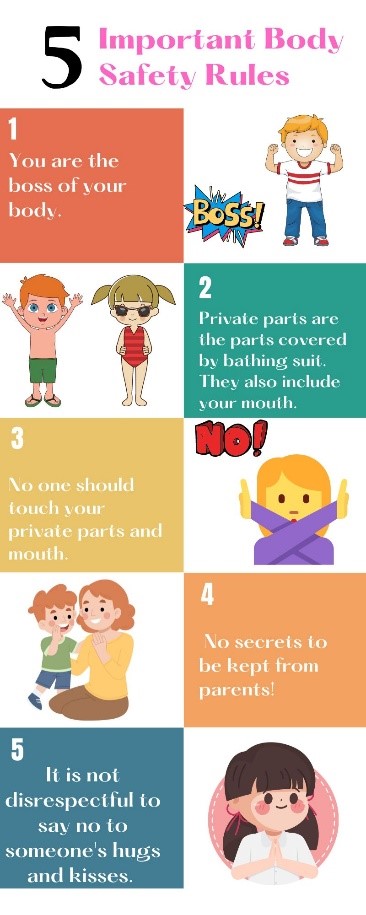
3) What is the appropriate age to teach children about Body Safety?
- The conversation around body safety needs to be preceded by correct knowledge of the names of a child’s body parts. Once the child knows about their body, parents can help them understand which parts are unsafe to touch. For example, it is ok for a child to give a high five or get a quick pat on the back or tap on the head.
- Body safety conversations need to start as early as two years of age.
- These conversations need to be tailored according to the child’s age. For example, for a two-year-old, a parent can indicate the body part, and the child can call it out as safe or unsafe.
- As the child grows, these conversations need to be reinforced and become more detailed.
4) What are the body safety rules for children?
Here are some essential body safety rules that we need to communicate to children.
1) Education about Body Ownership and Boundaries.
Children need to be instilled with a firm understanding that their bodies belong to them and they are the boss of their bodies. No one has the right to touch you in a way that makes you uncomfortable.
We need to teach children to create body boundaries that no one should be allowed to overstep. It is their right to speak up and stop someone who breaches the safety threshold set for them.
No uncle, aunt, or grandparent can force the child to give hugs, kisses, or sit on their lap.
Drawing such a clear boundary should not be viewed as disrespect to family or loved ones but a foremost and imperative step in ensuring the body safety of your child.
It sets the right body autonomy rules from an early age.
In most cases, the abuser is known to children and is someone from the family or a closely known person.
As parents, we go the extra mile to keep our children away from strangers but negligently grant unchecked access to family and friends. This unsupervised access can become an easy way for an abuser to take advantage.
Therefore, the same body safety rules for every adult will not confound your child.
2) Using anatomically correct names for the private parts:
Educate children on the correct usage of private parts. There should be no silly names kept for these body parts. Normalize the correct usage, as everyone has the same body parts.
3) Which body parts are private?
To offer an easy explanation to this question, we can tell children that the body parts covered by our swimsuits are our private body parts. We don’t let anyone view or touch these body parts. We also do not touch or view someone else’s private body parts.
4) Keeping Secrets.
- No secrets with parents! This should be your family’s number one rule. Also, the onus of this transparent communication is on the parents.
- How do you react when your child misbehaves, scores poor marks, and does something dissatisfactory?
Your response sets a precedent for the child to share or hide things from you. Children should be able to communicate without the fear of punishment or a negative response. - It is vital to teach children that no one can force them to keep any kind of secret from their parents, especially when it involves any secret pertaining to their bodies.
- If your child is five or above, you can explain that no threat to the child’s parents or the child should be a reason to let someone continue to harm them. Communicate in clear terms that the parents have the means to fight any threat posed by an adult or an older child.
5) Who are my Trusted Adults?
Ensure that your child has a circle of trusted adults apart from parents, like a teacher or a grandparent, they can confide in.
This is because, often, children are threatened or manipulated not to tell their parents. So, in this way, a second circle of safety is created for the child.
5) Activities for preschoolers to educate them about body safety:
Here are a few examples of how to engage preschoolers in body safety activities.
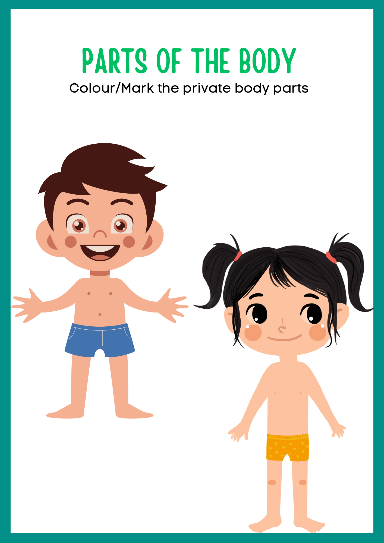
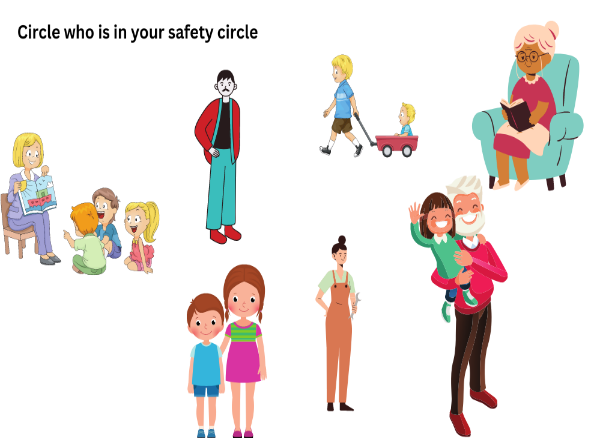
6) Book Recommendations on body safety rules for children.
Here are some of our book recommendations that will help you frame and initiate body safety talk with your child:
- My Body! What I Say Goes!
by Jayneen Sanders
(Age Group 8 to 12.)
- C is for Consent
by Eleanor Morrison
(Age Group 3 to 5 years.)
- Little Big Chat Series
by Jayneen Sanders
(Age Group 2 to 6 years.)
- No Means No
by Jayneen Sanders
(Age Group 2 to 9 years.)
- The ABC of Body Safety and Consent
by Jayneen Sanders
(Age Group: 4 to years.)
Summarising
Body Safety does not relate to education on sex and sexual abuse. These talks are age-appropriate communication on keeping one’s body safe. This communication should not make the child fearful.
To educate our children, we need to first remove the taboos around discussing such topics. Increased transparency around the topic of body safety will lead to strengthened vigilance and communication.
It will also make your child aware of their safety when you are not around.
Silverline, one of the top primary schools in Ghaziabad, considers the subject of children’s body safety paramount, and we hope to see more open dialogues amongst parents, educators, and children around it.

Silverline Prestige School, Ghaziabad
Recent Posts

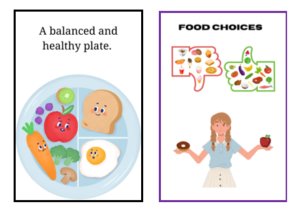
Nutrition for school-going children: What’s on your child’s plate?

Green Clean Globe: A Tree Planting Initiative by Silverline Prestige.

